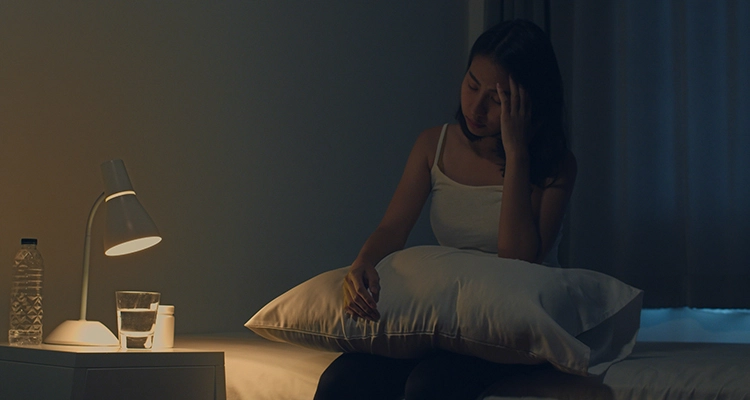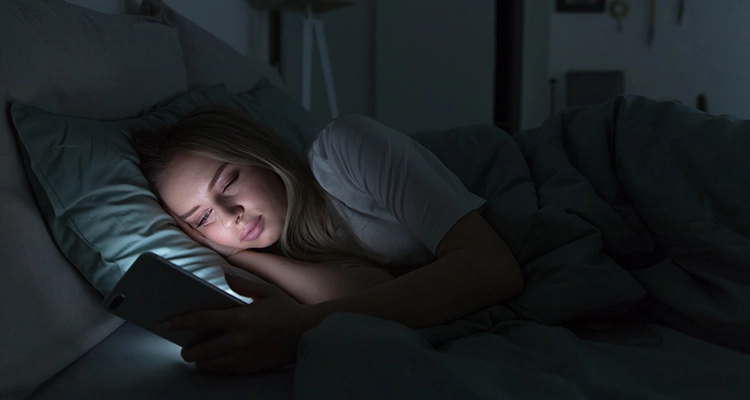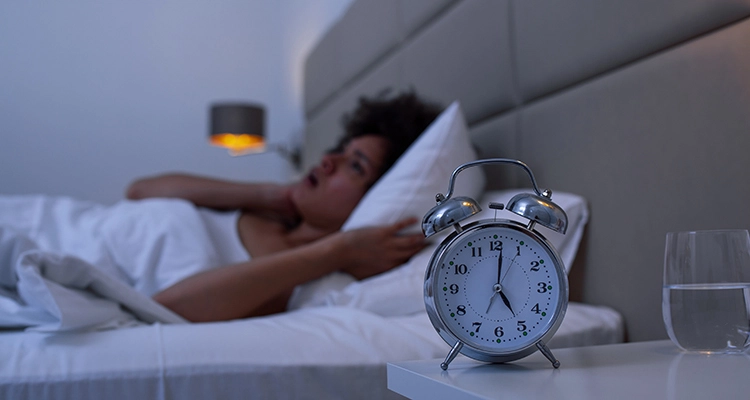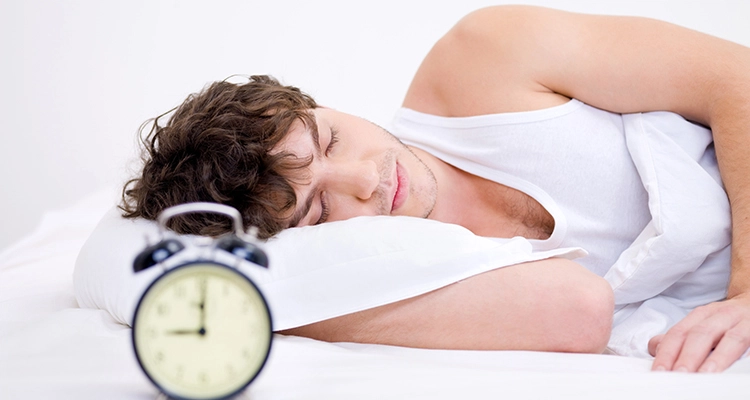Terminal Insomnia: What It Is and How to Treat It
Most people associate insomnia with the inability to sleep all night long. The truth is, there are several different types of insomnia — each one affecting a person’s sleep patterns in different ways. While chronic insomnia persists for three months or more, acute insomnia is a short-term condition usually triggered by a specific event or occurrence. Both types are marked by trouble falling and staying asleep. Terminal insomnia is different.

Individuals with those types of insomnia have no trouble falling asleep initially but are often woken up during the night and find it nearly impossible to fall back asleep. This long break in your sleep schedule can cause a myriad of unpleasant side effects.
In this article, we’ll discuss what terminal insomnia is, including symptoms and signs, potential causes, and what you can do to establish more consistent sleep patterns.
Content
What is Terminal Insomnia?
Terminal insomnia is also known as early morning awakening insomnia or late insomnia and is characterized by waking up earlier than needed. For many people, this happens on a consistent basis, resulting in unhealthy sleep patterns and low-quality sleep. While people with terminal insomnia generally have no issues with falling asleep, they wake up too early in the morning and are unable to fall back asleep. For example, you may fall asleep at 10:00 p.m. only to wake at 2:00 a.m. without ever falling back to sleep. This can leave you feeling groggy and sluggish by the time you were intended to wake up around 6:00 or 7:00 a.m. Some people don’t feel the immediate side effects of terminal insomnia but instead, find themselves crashing in the afternoon in need of a nap or caffeine boost. While this may leave you feeling energized at the moment, these afternoon “fixes” can sabotage your sleep for the upcoming night, creating a vicious cycle of insomnia.

It’s important to note that terminal insomnia is different from just being a short sleeper. While it’s recommended that adults get between 7 and 9 hours of sleep, some function perfectly fine on only 5 or 6 hours of sleep. If this describes you, you’re likely not suffering from terminal insomnia. Instead, if your sleep is cut short by waking too early and you’re left feeling tired and unfocused, that’s your body’s way of signaling you need more sleep and you’re not getting a sufficient amount.
Causes of Terminal Insomnia
As with most sleep disorders, there are countless potential causes of terminal insomnia. Stress, anxiety, depression, health issues, and chronic pain can all cause terminal insomnia.

Stress, Anxiety, and Depression
When it comes to your mental health and wellbeing, increased stress, anxiety, or depression can make it difficult to achieve a quality night’s sleep. While racing thoughts may not stop you from falling asleep, they may be persistent enough to wake you early in the morning and prevent you from going back to sleep. Anxiety can increase at night when your mind and body are at rest. Stress can trigger nightmares and unwanted thoughts, waking you from a deep sleep and making it hard to quiet your mind again. While some people associate depression with a lack of ambition and an increased need to sleep, this mental health disorder can also make it difficult to stay asleep. Some people also experience increased stress and anxiety over their inability to sleep well, exaggerating symptoms.
Environmental Factors and Changes
The smallest things can disrupt your sleep routine from the seasonal time change and travel to other external factors and disturbances. If you’ve recently traveled and are experiencing jet lag, your internal clock is unbalanced. This negatively affects your body’s sleep-wake cycle — also known as your circadian rhythm. Your internal sleep-wake cycle signals when it’s time to wake up and when it’s time for sleep. Traveling between different time zones requires you to go to bed and wake up at different times than you’re used to. This can significantly disrupt your sleep patterns, causing you to wake even earlier than normal.
Disturbances in your environment can also cause you to wake earlier than intended. The sun coming up, garbage trucks outside, and other noise and light disturbances may interrupt your sleep and make it difficult to return to a relaxed state. Terminal insomnia is also common among pregnant women and parents of newborns. Waking up in the middle of the night or during the early-morning hours is par for the course when it comes to parenthood. In most cases, when your infant establishes a more consistent sleep schedule, you too can reestablish healthy sleep patterns.
Chronic Pain and Other Health Issues
Chronic pain is a leading cause of insomnia, making it difficult to find and maintain a comfortable sleeping position. Some people take medication before bed to help reduce their pain, ease symptoms, and promote sleep. The problem is, once this medication wears off and the discomfort returns, many people are awoken and can’t fall back asleep. Other health conditions including sleep apnea, nasal congestion, gastrointestinal issues, and cardiovascular disease can all trigger you to wake up too early and remain awake.
Signs and Symptoms of Terminal Insomnia
Are you unsure if your inconsistent sleep patterns are a sign of a bigger issue, like terminal insomnia? While waking up too early without falling back asleep can happen to anyone once in a while, if it occurs on a regular basis, something else may be amiss. Here are a few signs and symptoms that your sleep disturbances may be attributed to terminal insomnia.

- Waking up before your alarm with no cause or trigger
- Waking up at the same time every morning without falling back asleep
- Increased anxiety over lack of sleep
- Lying awake in bed for more than 30 minutes after waking prematurely
- Feeling drowsy, groggy, or tired the next day
- Feeling drowsy, groggy, or tired several hours after waking too early
- Lack of motivation
- Inability to carry out daily tasks and responsibilities
- Problems with focus and memory
The effects of terminal insomnia can present themselves in numerous ways, depending on the cause and your specific condition.
Terminal Insomnia Techniques and Treatment Options
Treating terminal insomnia can be tricky, especially if you’re unsure of the cause. There are several techniques and treatment options available to not only determine what’s triggering your sleep disturbances but also help ease symptoms and improve your sleep quality.

Keep a Journal
Journals are a useful tool in all forms of therapy, including terminal insomnia therapy. By documenting what time you wake up, how long you’re awake, and how you felt when you woke up, you may be able to pinpoint a cause or trigger of your condition. Take note of specific things including if you feel hot or cold, any light or noise disturbances, if you’re in any pain, and any anxious or stressful thoughts. Write down everything. The more information you include, the better able you’ll be to make changes to your environment and potentially reduce the frequency of your sleep disturbances.
Avoid Lying Awake in Bed
This can be very difficult for individuals with terminal insomnia, mostly because they’re often awake for hours at a time or permanently once they awake too early. While your ultimate goal is to be able to fall back to sleep after waking, lying in bed willing yourself to sleep never works. In fact, staying in bed for longer than 15 minutes while awake can create a negative pattern of behavior with increasingly negative effects. Your bed is meant for sleep and sex only. By remaining in bed awake for too long, you’re confusing your mind and body into thinking it’s okay to be awake while in bed. Instead, you want your mind to associate your bed with rest and sleep.
If you do wake up too early and can’t fall back asleep after 15 minutes, get up and perform a relaxing or calming activity. Take a quiet walk around the inside of your house, have a cup of warm tea, or meditate. Once you feel tired enough to sleep, return to your bed. It may take some time for this sleep habit to take hold but if you consistently perform these routines, you’ll increase your chances of sleeping through the night.
Create a Sleep Oasis
Your environment plays an important role in achieving quality sleep. It may also be the cause of your terminal insomnia. Outside noises, light, and other disturbances that wake you too early can also make it nearly impossible to fall back asleep. By creating a sleep oasis in your bedroom, you’re promoting a restful night’s sleep free from unwanted interruptions.
Start by investing in room darkening shades that keep out any external light. This will prevent street lights, lights from neighboring houses, or the sunrise from waking you prematurely. Sleep masks can also block out any additional light. Noise is another common sleep disruption. Use a sound machine or fan to reduce external noises and create white noise in your bedroom. Your comfort is key, especially if chronic pain is the cause of your terminal insomnia. Invest in a quality mattress, pillow, and bedding to ensure comfort and reduce pain. Doing so may help you sleep longer and reduce how often you wake up.
Engage in Physical Exercise
Exercise benefits both your mind and body and can have a positive effect on your sleep quality. Engaging in exercise or physical activity during the day makes you more tired at night. This can help you fall into a deeper sleep and stay asleep longer. Avoid exercising too close to bedtime, which can have adverse effects, leaving you alert and energized. Physical activity can also help ease some pain symptoms associated with specific conditions. Be sure to check with your doctor before adopting a new exercise routine that may worsen symptoms or cause injury. Physical therapy is a common technique used to reduce pain and restore mobility. It can also promote better, longer sleep.
Adopt a Healthy Diet and Behaviors
Everything you do during the day affects how well you sleep at night, including your behaviors and diet. Avoid eating large, fattening meals, especially too close to bedtime. Doing so can cause gastrointestinal issues including cramps, nausea, and heartburn. Eating too close to bedtime can also trigger your body into thinking it should be awake enough to digest. All of these factors can disrupt your sleep and cause you to wake prematurely. Eliminate other unhealthy habits including smoking cigarettes and drinking alcohol in excess. Nicotine is a stimulant that can prevent you from entering a deep sleep. While alcohol may induce sleep at first thanks to its sedative properties, once your liver metabolizes the alcohol’s enzymes, it can cause significant sleep disturbances.
Take Control of Your Sleep Quality
Terminal insomnia doesn’t have to rule your life. By identifying the root cause of your sleep disturbances, you can start making changes to improve your sleep quality and prevent unwanted interruptions. Countless things can cause this form of insomnia including environmental factors, stress, and certain health conditions. A healthy mix of lifestyle changes and therapy can help you take control of your sleep quality once and for all.

At Somnus Therapy, we help you identify, understand, and accept your sleep disorder while also offering information support, and resources to guide your recovery journey.













